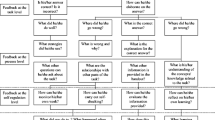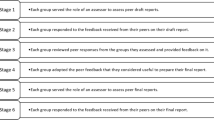Abstract
Peer feedback is an inherent feature of classroom collaborative learning. Students invariably turn to their peers for feedback when carrying out an investigative task, and this feedback is usually implicit, unstructured and may positively or negatively influence students’ learning when they work on a task. This study explored the characteristics of verbal peer feedback during a collaborative investigative chemistry task involving New Zealand Year 13 students. During the planning stage of the students’ investigation, the discussions of five pairs of students were recorded and then transcribed. Analysis of transcribed verbal data focused on interactions that involved peer feedback along two dimensions, interactive/non-interactive and dialogic/authoritative (Mortimer and Scott, 2003). The findings indicated that although students adopted a predominantly interactive/authoritative communicative approach, with peer feedback as confirmation or evaluation, they are also capable of a more interactive/dialogic exchange, characterised by elaborative peer feedback. We discuss how this dialogic perspective on peer feedback provides an alternative approach to the analysis and study of student–student interactions during science investigations. The findings should be interpreted in light of the limitations in terms of sample size, grouping and specificity of the coding scheme. Implications for teacher practice are discussed in relation to facilitating peer feedback discourse in the science classroom.
Similar content being viewed by others
Notes
NCEA is the national qualification system for students at New Zealand secondary schools.
References
Abd-El-Khalick, F., Boujaoude, S., Duschl, R., Lederman, N. G., Mamlok-Naaman, R., Hofstein, A., et al. (2004). Inquiry in science education: international perspectives. Science Education, 88(3), 397–419.
Aguiar, O. G., Mortimer, E. F., & Scott, P. (2010). Learning from and responding to students’ questions: the authoritative and dialogic tension. Journal of Research in Science Teaching, 42(2), 174–193.
Alexander, R. (2004). Towards dialogic teaching. York: Dialogos.
Alexopoulou, E., & Driver, R. (1996). Small-group discussion in physics: peer interaction modes in pairs and fours. Journal of Research in Science Teaching, 33, 1099–1114.
Arvaja, M., Häkkinen, P., Eteläpelto, A. & Rasku-Puttonen, H. (2000). Collaborative processes during report writing of a science learning project: the nature of discourseas a function of task requirements. European Journal of Psychology of Education, 15(4), 455–466.
Bakhtin, M. M. (1981). The dialogic imagination: four essays. Austin: University of Texas Press.
Bakhtin, M. M. (1986). Speech genres and other late essays. Austin: University of Texas Press.
Barnes, D., & Todd, F. (1995). Communication and learning revisited. Portsmouth, NH: Heinemann.
Bleicher, R., Tobin, K., & McRobbie, C. (2003). Opportunities to talk science in a high school chemistry classroom. Research in Science Education, 33, 319–339.
Braun, V., & Clarke, V. (2006). Using thematic analysis in psychology. Qualitative Research in Psychology, 3(2), 77–101.
Cameron, D. (2001). Working with spoken discourse. Thousand Oaks, CA: Sage.
Carlsen, W. S. (1991). Questioning in classrooms: a sociolinguistic perspective. Review of Educational Research, 61, 157–178.
Chigeza, P. (2011). Cultural resources of minority and marginalised students should be included in the school science curriculum. Cultural Studies of Science Education, 6(2), 401–412.
Chin, C. (2006). Classroom interaction in science: teacher questioning and feedback to students’ responses. International Journal of Science Education, 28(11), 1315–1346.
Cohen, E. G., & Lotan, R. A. (1995). Producing equal-status interaction in the heterogenous classroom. American Educational Research Journal, 32, 99–120.
Dillon, J. T. (1985). Using questions to foil discussion. Teaching and Teacher Education, 1, 109–121.
Duschl, R. A., & Osborne, J. (2002). Supporting and promoting argumentation discourse in science education. Studies in Science Education, 38, 39–72.
Duschl, R. A., Schweingruber, H. A., & Shouse, A. W. (Eds.). (2006). Taking science to school: learning and teaching science in grades K-8. Washington, DC: National Academies Press.
Edwards, D., & Mercer, N. (1987). Common knowledge: the development of understanding in the classroom. London: Methuen.
Gan, M. (2011). The effects of prompts and explicit coaching on peer feedback quality (Unpublished doctoral dissertation). The University of Auckland, Auckland, New Zealand.
González, N., & Moll, L. C. (2002). Cruzando el puente: building bridges to funds of knowledge. Educational Policy, 16(4), 623–641.
González, N., Moll, L. C., & Amanti, C. (2005). Funds of knowledge: theorizing practices in households, communities, and classrooms. Mahwah, NJ: Lawrence Erlbaum.
Gott, R., & Roberts, R. (2008). Concepts of evidence and their role in open-ended practical investigations and scientific literacy; background to published papers. UK: The School of Education, Durham University.
Hattie, J., & Gan, M. (2011). Instruction based on feedback. In R. E. Mayer & P. Alexander (Eds.), Handbook of research on learning and instruction (pp. 249–271). New York: Routledge.
Hodson, D. (2009). Teaching and learning about science: language, theories, methods, history, traditions and values. Rotterdam, the Netherlands: Sense.
Howe, C. (2009). Collaborative group work in middle childhood: joint construction, unresolved contradiction and the growth of knowledge. Human Development, 39, 71–94.
Howe, C., Tolmie, A., Duchak-Tanner, V., & Rattray, C. (2000). Hypothesis testing in science: group consensus and the acquisition of conceptual and procedural knowledge. Learning and Instruction, 10, 361–391.
Howe, C., Tolmie, A., Thurston, A., Topping, K., Christie, D., Livingston, K., et al. (2007). Group work in elementary science: towards organisational principles for supporting pupil learning. Learning and Instruction, 17, 549–563.
Katchevich, D., Hofstein, A., & Mamlok-Naaman, R. (2013). Argumentation in the chemistry laboratory: inquiry and confirmatory experiments. Research in Science Education, 43, 317–345.
Kelly, G. J. (2007). Discourse in science classrooms. In S. K. Abell & N. G. Lederman (Eds.), Handbook of research on science education (pp. 443–469). Mahwah, NJ: Lawrence Erlbaum.
Lemke, J. (1990). Talking science: language, learning and values. Norwood, NJ: Ablex Publishing.
Li, L., Liu, X., & Steckelberg, A. L. (2010). Assessor or assessee: how student learning improves by giving and receiving peer feedback. British Journal of Educational Technology, 41(3), 525–536.
Lincoln, Y. S., & Guba, E. G. (1985). Naturalistic inquiry. Newbury Park, CA: Sage.
Mehan, H. (1979). Learning lessons. Cambridge, MA: Harvard University Press.
Mercer, N. (2004). Sociocultural discourse analysis: analysing classroom talk as a social mode of thinking. Journal of Applied Linguistics, 1, 137–168.
Mercer, N., & Littleton, K. (2007). Dialogue and the development of children’s thinking: a sociocultural approach. London: Routledge.
Michaels, S., O’Conner, C., & Resnick, L. (2008). Deliberate discourse idealised and realised: accountable talk in the classroom and in civic life. Studies in Philosophy and Education, 27, 283–297.
Moje, E. B. (1995). Talking about science: an interpretation of the effects of teacher talk in a high school science classroom. Journal of Research in Science Teaching, 32, 349–371.
Mortimer, E., & Santos, F. (2003). Changing referential perspective in science classroom discourse. In D. Psillos, P. Kariotoglou, V. Tselfes, E. Hatzikraniotis, G. Fassoulopoulos, & M. Kallery (Eds.), Science education research in the knowledge based society (pp. 69–78). Dordrecht, the Netherlands: Kluwer.
Mortimer, E., & Scott, P. (2000). Analysing discourse in the science classroom. In R. Miller, J. Leach, & J. Osborne (Eds.), Improving science education: the contribution of research (pp. 126–142). Buckingham, UK: Open University Press.
Mortimer, E., & Scott, P. (2003). Meaning making in secondary science classrooms. Maidenhead: Open University Press.
Newton, P., Driver, R., & Osborne, J. (1999). The place of argumentation in the pedagogy of school science. International Journal of Science Education, 21(5), 553–576.
O’Donnell, A. M. (2006). The role of peers and group learning. In P. Alexander & P. Winne (Eds.), Handbook of educational psychology (2nd ed., pp. 781–802). Mahwah, NJ: Lawrence Erlbaum.
Osborne, J., Erduran, S., & Simon, S. (2004). Enhancing the quality of argumentation in school science. Journal of Research in Science Teaching, 41, 994–1020.
Piliouras, P., & Evangelou, O. (2012). Teachers’ inclusive strategies to accommodate 5th grade pupils’ crossing of cultural borders in two Greek multicultural science classrooms. Research in Science Education, 42(2), 329–351.
Rawlins, P. (2013). Questioning as formative assessment: investigating the use of the ESRU framework to guide students’ learning. Assessment Matters, 5, 30–48.
Ruiz-Primo, M. A. (2011). Informal formative assessment: the role of instructional dialogues in assessing students’ learning. Studies in Educational Evaluation, 37(1), 15–24.
Scott, P. (1998). Teacher talk and meaning making in science classrooms: a Vygotskian analysis and review. Studies in Science Education, 32, 45–80.
Scott, P., Motimer, E., & Aguiar, O. (2006). The tension between authoritative and dialogic discourse: a fundamental characteristic of meaning making interactions in high school science lessons. Science Education, 90, 605–631.
Scott, P., Ametller, J. Mortimer, E., Gerais, M., & Emberton, J. (2010). Teaching and learning disciplinary knowledge: Developing the dialogic space for an answer when there isn’t even a question. In K. Littleton & C. Howe (Eds.), Educational dialogues:Understanding and promoting productive interaction (pp. 287–303). New York: Routledge.
Seiler, G. (2013). New metaphors about culture: implications for research in science teacher preparation. Journal of Research in Science Teaching, 50(1), 104–121.
Sinclair, J., & Coulthard, R. M. (1975). Towards an analysis of discourse: the English used by teachers and pupils. Oxford: Oxford University Press.
Stamovlasis, D., Dimos, A., & Tsaparlis, G. (2006). A study of group interaction processes in learning lower secondary physics. Journal of Research in Science Teaching, 43(6), 556–576.
Thomas, D. R. (2006). A general inductive approach for analysing qualitative evaluation data. American Journal of Evaluation, 27, 237–246.
Topping, K. J. (2005). Trends in peer learning. In K. Wheldall (Ed.), Developments in educational psychology: how far have we come in 25 years? (pp. 59–73). London: Routledge Falmer.
Van Zee, E., & Minstrell, J. (1997). Reflective discourse: developing shared understandings in a physics classroom. International Journal of Science Education, 19, 209–228.
Webb, N. M. (2009). The teacher’s role in promoting collaborative dialogue in the classroom. British Journal of Educational Psychology, 79, 1–28.
Webb, N. M., & Mastergeorge, A. M. (2003). The development of students’ learning in peer directed small groups. Cognition and Instruction, 21, 361–428.
Webb, N. M., Nemer, K. M., & Zuniga, S. (2002). Short circuits or superconductors? Effects of group composition on high-achieving students’ science performance. American Educational Research Journal, 39, 943–989.
Yin, R. K. (2003). Case study research: design and methods. Thousand Oaks, CA: Sage.
Author information
Authors and Affiliations
Corresponding author
Rights and permissions
About this article
Cite this article
Gan Joo Seng, M., Hill, M. Using a Dialogical Approach to Examine Peer Feedback During Chemistry Investigative Task Discussion. Res Sci Educ 44, 727–749 (2014). https://doi.org/10.1007/s11165-014-9403-4
Published:
Issue Date:
DOI: https://doi.org/10.1007/s11165-014-9403-4




